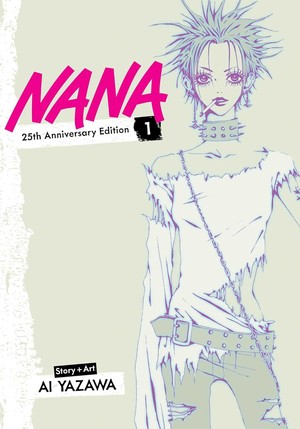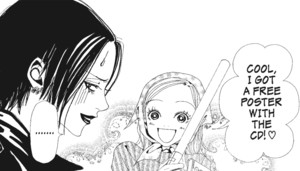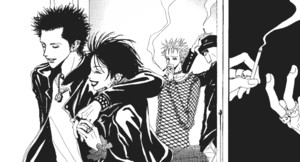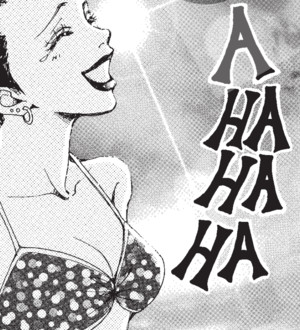The Fall 2025 Manga Guide
NANA 25th Anniversary Edition
What's It About?

After a string of epic romantic failures, Nana Komatsu is ready to take control of her life and get a clean start in the big city. After prioritizing her musical ambitions over love, Nana Osaki is ready to stomp her way to the top of Tokyo's punk scene. With determination in their hearts and dreams in their eyes, these two women are ready to take the world by storm! But first, they need a place to live. Roommates, anyone?
Anxious to get into a Tokyo groove, both women are on the prowl for a funky and cheap place to live. But inexpensive apartments in Japan's capital city are hard to find. Thank goodness each Nana has a clique of cool friends willing to help out. Too bad these friends are a little eccentric!
NANA 25th Anniversary Edition, Vol. 1 is written and drawn by Ai Yazawa. English translation by Allison Wolfe and Koji Goto. Lettered by Sabrina Heep. Published by Viz Media (October 21, 2025).
Is It Worth Reading?
Kevin Cormack
Rating:

NANA is a story I've been meaning to read for years, ever since I was frustrated by stupid international licensing issues back in the early 2000s when it was serialized in Viz Comics' Shojo Beat anthology, a magazine blocked from distribution in the UK. Finally, after two decades, I finally get to experience what I was missing, and it seems I missed a lot. From this first double-volume omnibus collection, I have already fallen in love with both characters named Nana, their friends, and their world. My wallet's likely to become a lot lighter now that I feel driven to fill my shelves with everything else written by author Ai Yazawa. (I was already hooked by her Last Quarter book that I reviewed for a previous manga guide, seeking out both physical volumes the moment they saw publication.)
There's a reason that NANA remains one of the top-selling shojo comics of all time, and that's because its appeal is so universal, it makes me wonder what the point of such limiting demographic labels is. Beginning with two lengthy one-shot stories, each about a different young woman named “Nana”, the story itself doesn't properly get going until the deceptively titled “chapter one”, one hundred and eighty-three pages (halfway) into this volume! That's deliberate on the part of author Yazawa, commissioned to write these one-shot stories, but she cleverly wrote them so she could tie them together later, should she be offered a longer-term serial. That her planning came to fruition is a cause for celebration, because I adored this story, with its lengthy two-part prologue and all.
Nana Komatsu is a boy-crazy teenager approaching the end of high school, having had her heart broken multiple times over by a string of deeply inappropriate crushes and a disastrous relationship with a married man. When her friends move to Tokyo to pursue college, she's unable to immediately follow and must spend a year “growing up” before joining them later. Nana Osaki is a high school dropout and lead singer in a punk band, hopelessly devoted to her guitarist boyfriend. When he's offered a potentially lucrative career in a newly signed band with a guitarist opening, he leaves for Tokyo, and their relationship fizzles out. Almost two years later, Nana also sets out for Tokyo to follow her dreams. And on the train there, by chance, both Nanas sit together and instantly become friends.
Yazawa's eye for characterization is second to none – all of her characters, whether main or supporting, display complex interiority, intriguing flaws, competing motivations, and general likability. These college-age kids converse, bicker, and fool around like real, living people, and already I'm desperate to know where their stories go next. Everyone's kind of lanky and waif-like, but their designs are incredibly expressive, and the way their faces break out in beaming smiles or abject misery, while deliberately cartoonish, really help to sell their emotions. Last Quarter had me intrigued by Yazawa's manga, NANA, which has made me a lifelong fan. Thanks, Yazawa. My wallet now hates me.
Caitlin Moore
Rating:

Really now, is there anything left to be said about Nana that hasn't been stated in the last 25 years? It is Ai Yazawa's magnum opus, a sprawling character study about two very different young women with the same name whose lives intersect when they both move to Tokyo at the same time and end up sharing an apartment. Nana Komatsu is an ordinary small-town girl who wants nothing more than to love and be loved; Nana Osaki is the hard-edged, charismatic front woman of the indie rock band The Black Stones. Both have a desperation for connection that leads them careening down a path to self-destruction that neither can save the other from.
Forgive me if I'm showing too much of the manga's hand, but like I said, Nana is one of those legendary series that everyone seems to have an opinion on, and the narrative is just getting started in this two-in-one volume. It takes until the second half for the titular Nanas to even meet, the first volume devoted to contextualizing each one's move to Tokyo. Still, the delicate characterization that Yazawa has made her name on is present from the very first pages, granting us an understanding of just what drives these two girls. This sense is what makes Nana so compelling as a human drama and separates it from more lurid soap operas, fun as those may be in their own right.
Yazawa's art is stunning as well, with the same delicate subtlety as the writing. Though the shoujo-esque slender limbs may not work for everyone, there's no denying the expressiveness and detail. Every character has their own physicality that's just as important for defining who they are as their words and choices. Tragically, this art also led Yazawa to develop health issues due to the physical strain of drawing manga, and Nana hasn't had a chapter released since 2009.
This edition has a new cover illustration, but on the inside, it's the same old release, including the original translation from 2005. The attempt at trying to capture how young adults barely out of their teens talk reads kind of awkwardly now – lots of “girl,” “man,” and “dude” as interjections. I don't mind it as a time capsule and as someone who was around the same age as the characters when this translation debuted, just like I don't mind Nana Komatsu's tall platform heels, but it may take new readers out. And for all that, seeing new art from Yazawa is a treat. I miss the old covers, which were a sequence of the Nanas going about their day together.
If you already have Nana on your shelf and in good condition, you probably don't need to shell out the money for this edition. However, if you don't, this is an excellent opportunity to fill a hole in your collection.
Bolts
Rating:

NANA will always hold a special place in my heart, whether I'm reading it or watching it. To this day, it is still one of those series that manages to portray characters that feel equal parts eccentric and real. The series is full of exaggerated comedy and reactions. There's even a lot of fourth wall breaks. But the problems that the characters are going through feel like things that I have seen in my everyday life. Characters try to make a name for themselves in a world that has just the right amount of cynicism to it, but at no point do they feel like perfect people who have all the answers. If anything, they barely have any of the answers in the story. It is just about them trying to desperately fit the world into the way that they want to look. But life isn't always that simple, and that's where the struggle in Nana is.
We have two characters named Nana who have very opposite worldviews. We have an overwhelming optimist who is the perfect example of somebody who is in love with the idea of being in love. This is a woman who romanticizes everything to the point that she even helped a man cheat on his wife. She is constantly chasing something good, yet ironically, she has little direction in life and is easy to take advantage of. On the inverse side, we have a more cynical Nana who has drive and direction, but it's left a few scars. This is a woman who has a lot of things that she's always wanted out of life and is trying everything that she can to hold onto them despite outside forces pulling those things away. She's definitely the more grounded of the two and just wants a happily ever after that she can earn rather than one that she finds.
When these two worlds intersect, you would think there would be conflict, but we end up getting this amazing blend that is perfectly able to showcase the various angles of young adulthood. It can be messy, it can be childish, and it can be depressing, but it's there in its raw, unapologetic form. It makes those brief moments of exaggerated comedy and levity through the art feel greatly needed so that the whole story doesn't feel like it's constantly dragging you down. I wouldn't call the story depressing (at least not yet), but it also feels like something that might accidentally hit a nerve depending on who you are. This edition covers so much material in the opening stages of these two girls' lives, and you are doing yourself a disservice if you have not exposed yourself to this franchise yet.
The views and opinions expressed in this article are solely those of the author(s) and do not necessarily represent the views of Anime News Network, its employees, owners, or sponsors.
discuss this in the forum (22 posts) |
back to The Fall 2025 Manga Guide
Seasonal homepage / archives